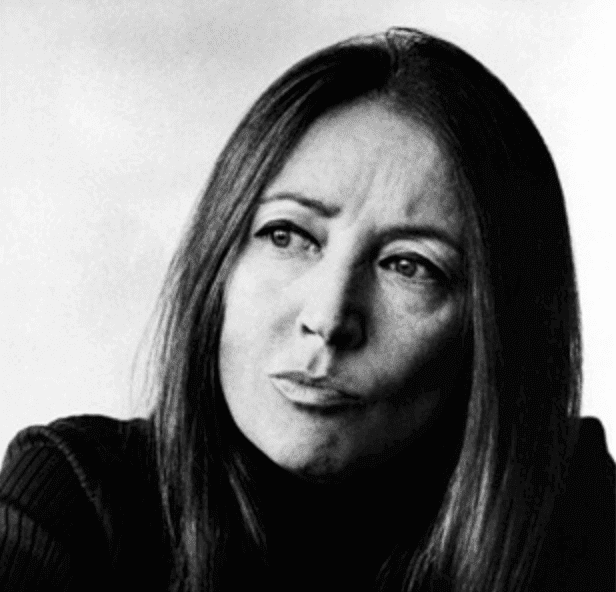Discover the biography of Oriana Fallaci, one of the world’s most acclaimed and read writers and journalists, his 12 books have been translated into more than 20 languages and an estimated 20 million copies of his works have been sold worldwide.
She distinguished herself above all as an interviewer, because no one knew how to highlight the most hidden aspects of celebrities and the characters who occupied the organs of power like her.
- Oriana Fallaci is one of the icons of the fourth power.
- Has shown that journalism with clear principles is capable of changing events.
Thanks to his sweet flute many of the most influential figures of the twentieth century have passed. They say everyone hated her and that was a sign to her that she was doing things right.
“If we stopped to consider what makes sense and what is not, what is possible and what is not, the Earth would stop spinning and life would lose its purpose. ” – Oriana Fallaci-
In addition to her journalistic work, she was also a wonderful writer, her direct, sensitive and fun style has captivated generations, in her work she tackles various types of topics: from the oppression of women in the Muslim world, through the history of Muhammad Ali and Vietnam, to the trip to the Moon.
As far as the trip to the Moon is specifically concerned, one of Oriana Fallaci’s most famous stories occurred during the Apollo 12 voyage, it is said that the captain of the trip, Charles Conrad, asked him to advise him on the phrase he could say when he landed the satellite . . . Because Conrad was a small man, Fallaci advised him to say, “This may have been a small step for Neil, but it was a big step for me. “
Oriana Fallaci was born in Florence, Italy, on July 29, 1929, to hear that her mother had a very strong personality, her father, Edoardo, was a humble carpenter, lover of the work of Marcel Proust and radically leftist. . Oriana was the first child and hoped she would be a man. Since that wasn’t the case, he raised her as a child.
His father taught him to shoot, hunt and resist pain situations without complaining. When fascism took control of Italy, Edoardo and his only 13-year-old daughter joined the resistance. Oriana Fallaci’s father was arrested and tortured by the Nazis during the occupation in Florence. She, on the other hand, served as human mail for the resistance.
At the end of the war, the Italian army awarded him a medal of honor for his bravery. At the time, Oriana Fallaci was only 14 years old. She was an excellent student and thanks to a scholarship she was able to study medicine, however, her fate would take her on other paths.
He ended up falling in love with journalism. By the age of 20, I was already in business.
Fallaci has worked for several small newspapers. In the late 1950s, he began writing for L magazine?European, which sends her to the United States to take notes on the entertainment industry, from this experience was born her first book, The Seven Capital Sins of Hollywood.
On this trip, Oriana felt her place was in the United States and moved to the countryside, moving to New York in the early 1960s.
He subsequently embarked on a series of trips to the East, which give rise to his works The Useless Sex and Pénélope Goes to War. Then came a series of articles and a book about NASA’s space projects.
In 1967 she was appointed war correspondent and continued to cover the Vietnam conflict, a situation that has led to several chronicles and one of her most famous books: Nada and Assim Seja.
From this moment on, his fame spreads all over the world, covering several social events. During the massacre in Plaza das Tr’s Culturas, Mexico, she was shot several, some people thought she was dead and sent her to the morgue, until an employee realized she was still alive and took her to the hospital.
In this next stage of Oriana Fallaci’s biography begins the era of her great interviews, it can be said that she managed to sit at the table with the most powerful men in the world at the time.
One of his memorable dialogues was the one he kept with Ayatollah Khomeini, in which he questioned him about the treatment of women and took away in his presence the clothes he had been forced to wear for the interview, much of this work was recorded in the book. Interview with History.
In 1973, just as he was conducting one of his interviews, he met Alexandros Pangulis, a Greek hero who had fought in the dictatorship, and the two fell in love.
The relationship ended three years later, when Pangulis died, a fact that deeply marked the life of Oriana Fallaci, who wrote the play Um Homem, who continued to succeed, but years later took refuge in her New York apartment.
There she was surprised by lung cancer and also on September 11. On this fact, she wrote such radical articles against Islam that three governments decided to sue for xenophobia.
In 2006, she secretly asked to be taken to her homeland, Florence, because she wanted to die in the city where she was born. Ten days later, on September 15, Oriana Fallaci died, leaving a unique journalistic legacy.

